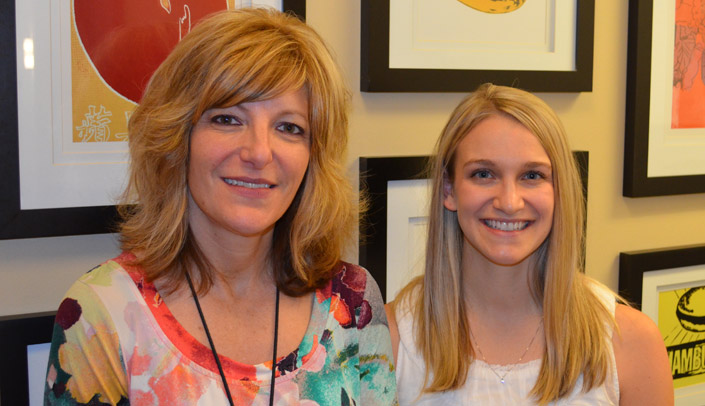Megan Berens looked up to Corrine K. Hanson, Ph.D., almost as soon as she joined UNMC’s dietetic internship program. Hanson, an assistant professor of medical nutrition in the School of Allied Health Professions and an instructor for several of Berens’ courses, would share her experiences in the clinical field with the class. She would talk about her research.
She wasn’t “officially” Berens’ mentor. But she was already an inspiration. “I saw how successful she’s been in our field and I looked up to her in that sense,” Berens recalled.
Today, Dr. Hanson is Berens’ master’s thesis advisor, putting an official stamp on their mentor-mentee relationship. But — aside from more one-on-one time — neither sees a big difference.
“It’s now an official relationship, because I am Megan’s advisor for her master’s degree,” Dr. Hanson said. “But I think that mentoring relationships can grow organically.”
Fostering organic mentoring relationships between UNMC alumni/faculty and students is a point of emphasis for the UNMC Graduate Studies and throughout the campus. As part of its effort to facilitate mentorship on campus, the Office of Graduate Studies has created a mentoring program that will help match interested graduate students with experienced alumni, as well as current faculty.
Dr. Hanson earned her Ph.D. in Pediatrics (Medical Sciences Interdepartmental Area graduate program) at UNMC. She and Berens are a perfect example of the way a Graduate Studies alumnus can positively impact the career of a current graduate student.
“In the field of biomedical research especially, the advice of an experienced researcher or alternative career mentor can have a deep and positive impact on the future goals and successes of learners at all levels,” said Dele Davies, M.D., Dean of Graduate Studies. “We all need mentors, beyond an official thesis or dissertation advisor, and UNMC has a community of committed faculty and alumni who can provide invaluable insight and inspiration as our students consider their calling and the best fit of academic and other paths to take in their career.”
For more information on the new mentor program, click here.
Dr. Hanson said she had been “unbelievably fortunate” in her own mentors.
“They are responsible for shaping me into the professional that I am now,” she said. “They’ve taught me and challenged me and done what a good mentor should do, which is get you out of your box a little bit, make you grow. I’ve had many, in all sorts of different areas of my life. So it’s very important to me to give that back, if I can.”
In some ways, she already has. In dealing with her own students, Berens draws from Dr. Hanson’s example as an instructor, working to foster her students’ growth and help them discover their passion within the field — as Hanson did for her, she encourages them to move outside of their comfort zone.
“Sometimes I think it would be fun to teach someday,” Berens said. “But then sometimes I think maybe I’d like to specialize in a certain area of the clinical field. Maybe I can do both.”
The campus emphasis on mentorship shows how important these relationships are, Dr. Hanson said.
“We consider this to be very important to the growth of our young investigators, our young faculty members, our young clinicians.”
And the growth is not all one way, Dr. Hanson emphasized.
“Megan also took a position here at Nebraska Medicine, so I also consider her a colleague now,” she said. “As time goes by, I’m learning from her — her thesis work, for example, is in an area that’s not necessarily my area of focus. So the relationship changes as time goes on.”
